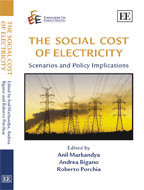The Social Cost of Electricity. Scenarios and Policy Implications

25.10.2010
Anil Markandya, Andrea Bigano and Roberto Porchia
Edward Elgar, Series on Economics, the Environment and Sustainable Development
This book reports and rationalizes the state of the art concerning
the social costs of electricity generation. Social costs are assessed by
adding to the private generation costs, the external costs related to
damages to human health, the environment, crops, materials, and those
related to the consequences of climate change. The authors consider the
evolution of these costs up to 2030 for major electricity generating
technologies and, using these estimates, evaluate policy options for
external cost internalization and provide quantitative scenarios, by
country and primary fuel, for 2010, 2020 and 2030. While mainly focusing
on European countries, the book also examines the situation in key
emerging economies such as China, India, Brazil and Turkey.
Contributors: H. Allal, S. Arnold, A. Behrens, A.
Bigano, M. Blesl, G. Bökenkamp, L. Brander, W.-J. Chou, D. Diakoulaki,
C. Egenhofer, R. Friedrich, K. Halsnæs, S. Hirschberg, O. Hohmeyer, A.
Hunt, O. Kuik, O. Løfsnes, K. Magnussen, A. Markandya, S. Navrud, T.
Niesor, W. Nijs, R. Porchia, P. Preiss, A. Rabl, L. Rosendahl
Appelquist, B. Tennbakk, C. Tourkolias, M. Urbani, A. van der Welle, B.
van der Zwaan, S. Wissel, X. Zhu
To receive a CD-Rom containing an electronic copy of all databases and
tools, please contact:
Publications Office
Fondazione Eni Enrico Mattei
Corso Magenta, 63
20123 Milano
Italy
Phone: +39 02 52036976
Fax: +39 02 52036946
e-mail: barbara.racah@feem.it
This book reports and rationalizes the state of the art concerning the social costs of electricity generation. Social costs are assessed by adding to the private generation costs, the external costs related to damages to human health, the environment, crops, materials, and those related to the consequences of climate change. The authors consider the evolution of these costs up to 2030 for major electricity generating technologies and, using these estimates, evaluate policy options for external cost internalization and provide quantitative scenarios, by country and primary fuel, for 2010, 2020 and 2030. While mainly focusing on European countries, the book also examines the situation in key emerging economies such as China, India, Brazil and Turkey.
Contributors: H. Allal, S. Arnold, A. Behrens, A. Bigano, M. Blesl, G. Bökenkamp, L. Brander, W.-J. Chou, D. Diakoulaki, C. Egenhofer, R. Friedrich, K. Halsnæs, S. Hirschberg, O. Hohmeyer, A. Hunt, O. Kuik, O. Løfsnes, K. Magnussen, A. Markandya, S. Navrud, T. Niesor, W. Nijs, R. Porchia, P. Preiss, A. Rabl, L. Rosendahl Appelquist, B. Tennbakk, C. Tourkolias, M. Urbani, A. van der Welle, B. van der Zwaan, S. Wissel, X. Zhu
***
All databases on emissions, external, private and social costs and the tools used for policy evaluation are available to the reader in a dedicated page of the CASES website.
To receive a CD-Rom containing an electronic copy of all databases and
tools, please contact:
Publications Office
Fondazione Eni Enrico Mattei
Corso Magenta, 63
20123 Milano
Italy
Phone: +39 02 52036976
Fax: +39 02 52036946
e-mail: barbara.racah@feem.it
